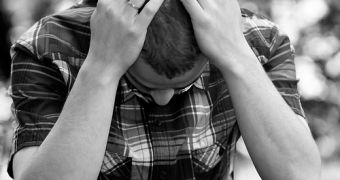People suffering from difficult and severe depression, have a chance of getting better, thanks to a new, pioneering neurosurgical treatment, which accurately targets brain networks involved in depression.
Depression is a disease that affects nearly 20% of people, at least once in their lifetime, and nearly half of them get well within six months.
The problem is that there are about 10% of depressed people that still suffer, even three years later, and from then on, patients have smaller chances of recovering, with about one in ten people getting better every year.
There are several common ways of treating depression, including specific psychotherapies, antidepressant drugs and electroconvulsive therapy (ECT).
Experience has confirmed that every time one method fails, the chances that the next treatment works decrease by a third.
This means that even if 60% of patients respond to the first treatment, only 10% respond to the fifth.
ECT might seem the most radical of all, but it remains the most efficacious short-term treatment.
The concern is that its effects can be short lasting and some people can have considerable side effects.
Chronic depression is a very serious disability, because affected people can lose their job, they are on benefits, they need to change homes and can lose their family.
Even worse, 15% of them commit suicide.
Dr Andrea Malizia is a Consultant Senior Lecturer in the School of Social and Community Medicine at the University of Bristol and the leader of this research, and along with Mr Nikunj Patel, Senior Clinical Lecturer in the Department of Neurosurgery at North Bristol NHS Trust, they are pioneering several treatments including experimental antidepressants, deep brain stimulation (DBS) and stereotactic neurosurgery.
One of the patients was so depressed, that her illness stopped responding to conventional treatments, so she was offered DBS.
She became a part of the first trial in the world stimulating two different brain networks involved in depression, but in her case, DBS triggered some temporary response, sadly not enough to make her feel better.
The patient, whose story will be presented tonight on BBC One’s Inside Out West, is now following further advanced stereotactic neurosurgery carried out in early 2010.
There are some patients that do not respond to DBS, or are not suitable for this kind of therapy, so in this case, they can opt for an ‘Anterior Cingulotomy’ using implantable guide tubes (GTAC), which has been specifically developed in Frenchay; this patient was the first to have it.
The operation changes circuits that are important in emotion and scientists believe to be overactive in a number of psychiatric disorders.
“Our patients and their families suffer enormously and it is often thought that nothing else can be done,” said Dr Malizia.
“This lady responded temporarily to two of the complex treatments that we initiated in Bristol, but in the end remission has only been achieved by persisting and moving on to the next advanced treatment.
“We are very grateful to our patients and their relatives who, in spite of depression destroying their lives, bravely carry on fighting the illness year after year, and also to the Friends of Frenchay Hospital who have donated DBS equipment - their support has been essential in starting this important endeavor.”
Deep brain stimulation consists of inserting thin wires, connected to a ‘pacemaker’, in the brain, so that the brain circuits specific to a certain condition can be inhibited or stimulated.
The circuits involved in depression monitor the regulation of emotion, oversee its integration with bodily and intellectual functions, and regulate internal drives.

 14 DAY TRIAL //
14 DAY TRIAL //